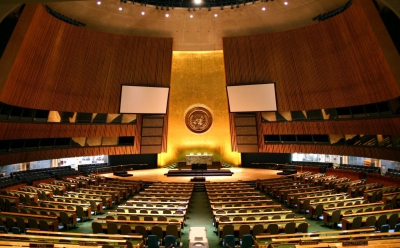The Palestine Liberation Organization (PLO; Arabic: , Munaamat at-Tarr al-Filasniyyah) is a Palestinian nationalist political and militant organization founded in 1964 with the initial purpose of establishing Arab unity and statehood over the territory of former Mandatory Palestine, in opposition to the State of Israel. In 1993, alongside the Oslo I Accord, the PLO's aspiration for Arab statehood was revised to be specifically for the Palestinian territories under an Israeli occupation since the 1967 ArabIsraeli War. It is headquartered in the city of Al-Bireh in the West Bank, and is recognized as the sole legitimate representative of the Palestinian people by over 100 countries that it has diplomatic relations with. As the official recognized government of the de jure State of Palestine, it has enjoyed observer status at the United Nations (UN) since 1974. Due to its militant activities, including acts of violence primarily aimed at Israeli civilians, the PLO was designated as a terrorist organization by the United States in 1987, although a later presidential waiver has permitted American contact with the organization since 1988. In 1993, the PLO recognized Israel's right to exist in peace, accepted Resolution 242 of the United Nations Security Council, and rejected "violence and terrorism". In response, Israel officially recognized the PLO as a legitimate authority representing the Palestinian people. However, despite its participation in the Oslo Accords, the PLO continued to employ tactics of violence in the following years, particularly during the Second Intifada of 20002005. On 29 October 2018, the Palestinian Central Council suspended the Palestinian recognition of Israel, and subsequently halted all forms of security and economic cooperation with it.
The United Nations General Assembly (UNGA or GA; French: Assemblée générale, AG) is one of the six principal organs of the United Nations (UN), serving as the main deliberative, policymaking, and representative organ of the UN. Currently in its 76th session, its powers, composition, functions, and procedures are set out in Chapter IV of the United Nations Charter. The UNGA is responsible for the UN budget, appointing the non-permanent members to the Security Council, appointing the Secretary-General of the United Nations, receiving reports from other parts of the UN system, and making recommendations through resolutions. It also establishes numerous subsidiary organs to advance or assist in its broad mandate. The UNGA is the only UN organ wherein all member states have equal representation.
The General Assembly meets under its president or the UN Secretary-General in annual sessions at UN headquarters in New York City; the main part of these meetings generally run from September to part of January until all issues are addressed (which is often before the next session starts). It can also reconvene for special and emergency special sessions. The first session was convened on 10 January 1946 in the Methodist Central Hall in London and included representatives of the 51 founding nations.
Voting in the General Assembly on certain important questions—namely recommendations on peace and security; budgetary concerns; and the election, admission, suspension or expulsion of members—is by a two-thirds majority of those present and voting. Other questions are decided by a simple majority. Each member country has one vote. Apart from the approval of budgetary matters, including the adoption of a scale of assessment, Assembly resolutions are not binding on the members. The Assembly may make recommendations on any matters within the scope of the UN, except matters of peace and security under the Security Council consideration.
During the 1980s, the Assembly became a forum for "North-South dialogue" between industrialized nations and developing countries on a range of international issues. These issues came to the fore because of the phenomenal growth and changing makeup of the UN membership. In 1945, the UN had 51 members, which by the 21st century nearly quadrupled to 193, of which more than two-thirds are developing. Because of their numbers, developing countries are often able to determine the agenda of the Assembly (using coordinating groups like the G77), the character of its debates, and the nature of its decisions. For many developing countries, the UN is the source of much of their diplomatic influence and the principal outlet for their foreign relations initiatives.
Although the resolutions passed by the General Assembly do not have the binding forces over the member nations (apart from budgetary measures), pursuant to its Uniting for Peace resolution of November 1950 (resolution 377 (V)), the Assembly may also take action if the Security Council fails to act, owing to the negative vote of a permanent member, in a case where there appears to be a threat to the peace, breach of the peace or act of aggression. The Assembly can consider the matter immediately with a view to making recommendations to Members for collective measures to maintain or restore international peace and security.

1974Nov, 22
The United Nations General Assembly grants the Palestine Liberation Organization observer status.
Choose Another Date
Events on 1974
- 18Jan
Yom Kippur War
A Disengagement of Forces agreement is signed between the Israeli and Egyptian governments, ending conflict on the Egyptian front of the Yom Kippur War. - 27Jun
Richard Nixon
U.S. president Richard Nixon visits the Soviet Union. - 27Jul
Richard Nixon
Watergate scandal: The House of Representatives Judiciary Committee votes 27 to 11 to recommend the first article of impeachment (for obstruction of justice) against President Richard Nixon. - 9Aug
Richard Nixon
As a direct result of the Watergate scandal, Richard Nixon becomes the first President of the United States to resign from office. His Vice President, Gerald Ford, becomes president. - 8Sep
Gerald Ford
Watergate scandal: US President Gerald Ford pardons former President Richard Nixon for any crimes Nixon may have committed while in office.

 English
English  español
español  français
français  português
português  русский
русский  العربية
العربية  简体中文
简体中文 